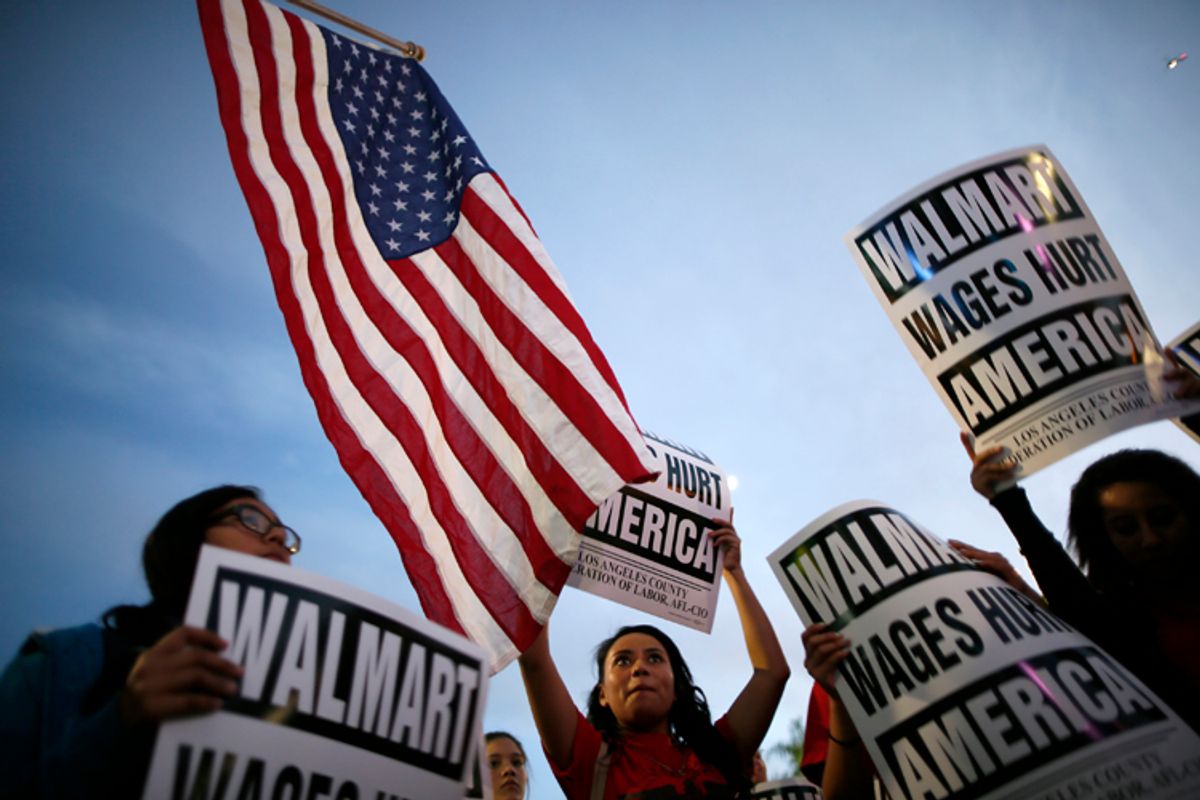Workers at a California Wal-Mart warehouse are owed $4.7 million for alleged theft of their wages, under a proposed settlement approved this week by a federal judge. The 568 workers were employed by the Wal-Mart contractor Schneider. All of the goods they move are for Wal-Mart, and the facility where they worked is partially owned by Wal-Mart.
A Schneider spokesperson emailed, "Per the settlement, I can only confirm for you that this matter has settled on terms acceptable to the parties." Wal-Mart did not respond to a request for comment on the case, Quezada v. Schneider. A spokesperson noted to the Huffington Post that the workers were not legally employed by Wal-Mart, and said, "We've developed a program where we do independent audits of each of our third-party-run warehouses, to make sure they're following all aspects of law."
“The brave workers who came forward to expose a deep pattern of abuse and fraud in Walmart’s largest [western U.S.] contracted facility risked their jobs and their livelihoods, but today they are vindicated,” said Warehouse Workers United Director Guadalupe Palma in an emailed statement. According to WWU, an expert’s review of 216,281 shifts there found that supervisors “shaved employees’ time” from time cards in 5.95 percent of shifts, denying them legally required pay.
WWU, a project of the Change to Win union federation, has worked in concert with the union-backed retail workers’ group OUR Walmart to pull off a series of strikes in the Wal-Mart supply chain since 2012. Workers’ lawsuits have represented one front in labor’s efforts to hold Wal-Mart accountable for conditions of its suppliers and contractors, which advocates argue are largely determined by Wal-Mart directives. In March, Judge Christina Snyder barred Schneider from communicating with employees about the Quezada suit without permission, on the grounds that it had behaved in “deceptive” and “coercive” ways in securing written statements from employees designed to undermine the plaintiffs’ case.
In court filings reported by the Huffington Post, lead plaintiff Quezada said, "I was often forced by my supervisors at the end of my shifts to sign forms saying I voluntarily waived my right to my meal breaks... Nothing about that process was voluntary, since I was being forced to sign."
While Quezada appears resolved, the parallel case Carrillo v. Schneider, involving workers subcontracted through Schneider in the same facility, remains ongoing. Unlike Quezada, Judge Snyder has found sufficient evidence to add Wal-Mart itself as a named defendant in Carrillo. Last year, a Wal-Mart spokesperson told me that Wal-Mart was merely “Schneider’s customer. We have a set of business needs that we pay them to meet just like any company might hire an accounting firm to do taxes or an advertising firm to help launch a new product.” But workers’ attorneys presented evidence that Wal-Mart directs Schneider's decisions, ranging from when a printer’s ink needs to be refilled to when to assign more or fewer workers to the unloading of a certain truck.
Schneider was also named in a February complaint issued by the National Labor Relations Board alleging that Schneider and three other companies it directly or indirectly employs illegally threatened or punished warehouse workers at a Wal-Mart-owned facility in Illinois, in an effort to discourage labor activism.

Shares